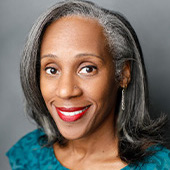5 minutes
Four cohorts in, 1-to-1Woman program demonstrates its positive impact on both mentees and mentors.
A March 2021 Gallup poll of U.S. workers found that Black women are the group that’s least likely to be classified as “thriving” in their places of employment. In the study, a little under half (47%) of Black women were classified as thriving. In contrast, 58% of white men, 53% of white women and a full half of Black men, Hispanic men and Hispanic women were considered to be thriving.
That Black women would be behind others in this area doesn’t surprise me. I’ve personally witnessed oversights. African American females lack workplace security because of a consistent downplay of their contributions, harsher critiques in group settings and financial strain, evident in the wage gap that Black women profoundly experience.
Thinking through these kinds of barriers, I wondered what the possibility could be to have a junior-level professional African American avoid resting in disempowering statistics by uniting her with an accomplished Caucasian woman who recognizes an ambitious and deserving generation.
This is what helped me envision 1-to-1Woman, a mentoring program that matches an African American junior-level professional with an executive-level Caucasian woman who has agreed to hear, coach and support her.
The African American Credit Union Coalition, led by Renee Sattiewhite, partnered in offering the pilot cohort in 2021, which included 18 women, nine mentee-mentor pairs. Participants received a workbook containing topics related to professional development, race/cultural bias and gender similarities. These were used to facilitate twice-weekly virtual conversations.
The program has grown from there, with cohorts running in partnership with the Montana Credit Union Network, CUES Supplier member Envisant and the Illinois Credit Union League, and the Michigan Credit Union League. In the remainder of 2022, three more cohorts are planned.
Making These Conversations Possible
But what created the psychological safety for these conversations to proceed? We all set protective guards to avoid harm and manage our insecurity. There is no mediator present during these one-to-one conversations with a (racial) stranger. And yet, these women agree to talk about topics involving subdued racial bias.
Jamilla Collins, a mentee in the AACUC pilot cohort and advocacy coordinator for the Ohio Credit Union League, describes her cautious approach to participating in the program.
“I have had my own personal beliefs rooted in poor experiences, which caused me to develop a mistrust of our sisters of a lighter shade,” Collins says. “I am not going to diminish my experiences by downplaying them, but I acknowledge that the effects of these negative interactions caused me to make sweeping judgments. I was still apprehensive about engaging in the 1-to-1Woman mentoring program, but I trusted the call-to-action of a woman I respect greatly, [Renee Sattiewhite].”
Positive Outcomes
Our recent 1-to-1Woman survey found that both mentee and mentor participants come away with new perceptions that had not existed prior to pairing. Some mentors revealed their uncertainty to connect and confront. Yet due to the mentors’ commitment and empathy, an evolved cultural competence occurred between two women of different ethnicities. (See a video with interviews with program participants here.)
CUES member Jill Johnson, a mentor in the Michigan Credit Union League cohort and SVP/chief lending officer at $1.2 billion Community Financial Credit Union in Plymouth, Michigan, says, “I was both honored and puzzled by the invitation to step into a mentoring relationship with a young African American woman. I believe in mentoring, and wanted to be part of it, but felt I lacked much to be a good match for a mentee with challenges I do not experience.
“I can say, without pause, that this has been an amazing experience!” she continues. “I have learned that we have a lot in common and I can be a resource to this amazing woman (and she to me as well). I have learned there is much I do not know, but in gaining some understanding, I can work to learn more and to facilitate change. Thank you for the connection of a lifetime and a life-changing growth opportunity for me, the mentor. Just wonderful!”
CUES member Melissa Ashley, CCE, a mentor in the AACUC pilot cohort and president/CEO of $6 billion Corporate One Federal Credit Union, Columbus, Ohio, says, “The 1-to-1Woman mentoring program gave me a unique opportunity to mentor a very smart, driven young woman from a completely different part of the U.S., career field and racial background. It was inspiring to see all of the young women in the program growing and learning to be more confident in their abilities. As a mentor, I also grew from the experience by gaining a better understanding of the challenges that African American women face in the workforce.”
Abondi Thorpe, a mentee in the Michigan Credit Union League cohort and financial resolutions specialist at $872 million Zeal Credit Union, Livonia, Michigan, captured the essence of 1-to-1Woman. “Thank you so much for putting together such an amazing program,” she says. “I have dissected the program on many levels, and you [Shellee] put a lot of thought into making this a well-rounded experience for both the mentor and mentee.”
Be Part of Making Progress
We can shudder at the turmoil in our society. Malicious hate crimes attempt to deter noble causes and the diligent ally. With the 1-to-1Woman mentoring program, Caucasian executive women make time in their demanding schedules and extend their network and resources. This is intentional progress to dismantle privilege and provide equity and inclusion for the African American mentee.
1-to-1Woman is a resolve to conjoin through our gender amidst the reality of scripted fears that weave history’s systemic racial hierarchy. With our participation, we decide to collaborate to create a stronger, more productive workforce that works toward the holistic fulfillment of African American women.
If you’re interested in joining a cohort, please email me. If you’re afraid to do so, acknowledge how you’re feeling, then email me anyway.
After all, conflict from cultural differences and indifference confirms racial mistrust and embeds the stain of U.S. history. In his book, The Magic of Thinking Big, David J. Schwartz, Ph.D., writes, “Yes, fear is real. And we must recognize it exists before we can conquer it. Jot down in your success rule book right now, ‘Action conquers fear.’”
Shellee A. Mitchell is the founder and principal consultant for Sapphire Dimension LLC, which encompasses various mentoring schools to extract disparities and enforce successful possibilities.






